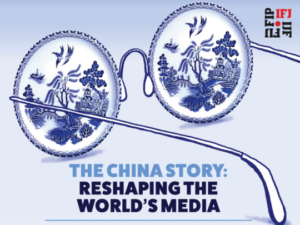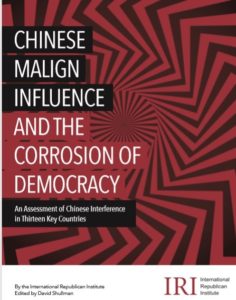Technological leadership from democracies has “never been more imperative…if we want to make sure that Western values are baked into the technologies of the future,” @USCTO tells @andersen https://t.co/tMALrRwGo3
— Democracy Digest (@demdigest) September 25, 2020
China is using artificial intelligence to enhance totalitarian control—and exporting this technology to regimes around the globe, notes analyst Ross Andersen. Xi Jinping’s pronouncements on AI have a sinister edge, he writes for the Atlantic Monthly:
Artificial intelligence has applications in nearly every human domain, from the instant translation of spoken language to early viral-outbreak detection. But Xi also wants to use AI’s awesome analytical powers to push China to the cutting edge of surveillance. He wants to build an all-seeing digital system of social control, patrolled by precog algorithms that identify potential dissenters in real time.
Technological leadership from democratic nations has “never been more imperative…. if we want to make sure that Western values are baked into the technologies of the future,” Michael Kratsios, the U.S. government’s chief technology officer, told Andersen.
 In the months-long standoff between the U.S. and Beijing over TikTok, China has emerged as the clear winner, Bloomberg reports.
In the months-long standoff between the U.S. and Beijing over TikTok, China has emerged as the clear winner, Bloomberg reports.
TikTok has been repeatedly caught copying text from millions of iPhones, which is a spying issue and it has been repeatedly caught censoring content critical of Beijing’s human rights abuses, which is a free-speech issue, The Post’s Josh Rogin writes.
“The competition in the tech sphere over such core values as free expression and privacy requires that democracies vigorously defend principles of transparency and democratic accountability,” said Christopher Walker, vice president for studies and analysis at the National Endowment for Democracy (NED). “All-encompassing global platforms such as WeChat and TikTok are a part of this equation.”
TikTok has become a symbol “of the new challenge a rising, tech-enabled China presents not simply to a free society, but to American dominance in the tech sector,” Michael Schuman, writes in the Atlantic.
 It is clear that technology and social media is increasingly becoming a front in foreign policy and diplomatic disputes – what does this mean for the evolution of tech and the internet? the British Foreign Policy Group adds.
It is clear that technology and social media is increasingly becoming a front in foreign policy and diplomatic disputes – what does this mean for the evolution of tech and the internet? the British Foreign Policy Group adds.
According to the statement on TikTok and WeChat released by the Department of Commerce, “the Chinese Communist Party (CCP) has demonstrated the means and motives to use these apps to threaten the national security, foreign policy, and the economy of the U.S. Today’s announced prohibitions, when combined, protect users in the U.S. by eliminating access to these applications and significantly reducing their functionality.”
 China is promoting a new synthesis of Maoism, nationalism, and “state‐ism,” with ideas borrowed from Carl Schmitt—the notorious German political thinker who helped inspire the rise of Nazism, the Cato Institute adds. This new authoritarian ideology, only now beginning to gain some notice in the West, is booming in China. In the words of the New York Times, it is even making some formerly liberal intellectuals “rethink the relationship between individual freedom and state authority.”
China is promoting a new synthesis of Maoism, nationalism, and “state‐ism,” with ideas borrowed from Carl Schmitt—the notorious German political thinker who helped inspire the rise of Nazism, the Cato Institute adds. This new authoritarian ideology, only now beginning to gain some notice in the West, is booming in China. In the words of the New York Times, it is even making some formerly liberal intellectuals “rethink the relationship between individual freedom and state authority.”
Cato’s online forum on features Timothy Cheek, Professor of Chinese Research, School of Public Policy and Global Affairs, University of British Columbia; Lynette Ong, Associate Professor of Political Science, Munk School of Global Affairs and Public Policy, University of Toronto; moderated by Mustafa Akyol, Senior Fellow, Cato Institute.
October 16, 2020 12:00 PM to 1:00 PM EDT RSVP







